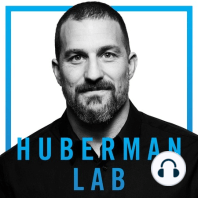80 min listen
Dr. David Anderson: The Biology of Aggression, Mating, & Arousal
FromHuberman Lab
ratings:
Length:
113 minutes
Released:
Sep 12, 2022
Format:
Podcast episode
Description
My guest is David Anderson, PhD, a world expert in the science of sexual behavior, violent aggression, fear and other motivated states. Dr. Anderson is a Professor of Biology at the California Institute of Technology (Caltech), a member of the National Academy of Sciences and an investigator with the Howard Hughes Medical Institute (HHMI). We discuss how states of mind (and body) arise and persist and how they probably better explain human behavior than emotions per se. We also discuss the many kinds of arousal that create varying levels of pressure for certain behaviors to emerge. We discuss different types of violent aggression and how they are impacted by biological sex, gender, context, prior experience, and hormones, and the neural interconnectedness of fear, aggression and sexual behavior. We also discuss peptides and their role in social isolation-induced anxiety and aggression. Dr. Anderson also describes novel, potentially powerful therapeutics for mental health. This episode should interest anyone wanting to learn more about mental health, human emotions, sexual and/or violent behavior.
Thank you to our sponsors
AG1 (Athletic Greens): https://athleticgreens.com/huberman
Levels: https://levels.link/huberman
Helix Sleep: https://helixsleep.com/huberman
LMNT: https://drinklmnt.com/huberman
Supplements from Momentous
https://www.livemomentous.com/huberman
Dr. David Anderson
Dr. David Anderson
The Nature of the Beast
Dr. David Anderson’s Lab
Dr. Anderson’s publications
Articles
Two Different Forms of Arousal in Drosophila Are Oppositely Regulated by the Dopamine D1 Receptor Ortholog DopR via Distinct Neural Circuits
Resources
Mouse switching from mating behavior to aggressive behaviors upon stimulation of VMH
VMH stimulation causes mouse to display aggressive behaviors toward an inanimate object (e.g., glove)
Picture of Periaqueductal Gray (PAG)
Timestamps
(00:00:00) Dr. David Anderson, Emotions & Aggression
(00:03:33) Momentous Supplements
(00:04:27) Levels, Helix Sleep, LMNT
(00:08:10) Emotions vs. States
(00:10:36) Dimensions of States: Persistence, Intensity & Generalization
(00:14:38) Arousal & Valence
(00:18:11) Aggression, Optogenetics & Stimulating Aggression in Mice, VMH
(00:24:42) Aggression Types: Offensive, Defensive & Predatory
(00:29:20) Evolution & Development of Defensive vs. Offensive Behaviors, Fear
(00:35:38) Hydraulic Pressures for States & Homeostasis
(00:38:33) AG1 (Athletic Greens)
(00:39:46) Hydraulic Pressure & Aggression
(00:44:50) Balancing Fear & Aggression
(00:48:31) Aggression & Hormones: Estrogen, Progesterone & Testosterone
(00:52:33) Female Aggression, Motherhood
(00:59:48) Mating & Aggressive Behaviors
(01:05:10) Neurobiology of Sexual Fetishes
(01:10:06) Temperature, Mating Behavior & Aggression
(01:15:25) Mounting: Sexual Behavior or Dominance?
(01:20:59) Females & Male-Type Mounting Behavior
(01:24:40) PAG (Periaqueductal Gray) Brain Region: Pain Modulation & Fear
(01:30:38) Tachykinins & Social Isolation: Anxiety, Fear & Aggression
(01:43:49) Brain, Body & Emotions; Somatic Marker Hypothesis & Vagus Nerve
(01:52:52) Zero-Cost Support, YouTube Feedback, Spotify & Apple Reviews, Sponsors, Momentous Supplements, AG1 (Athletic Greens), Instagram, Twitter, Neural Network Newsletter, Huberman Lab Clips
Title Card Photo Credit: Mike Blabac
Disclaimer
Thank you to our sponsors
AG1 (Athletic Greens): https://athleticgreens.com/huberman
Levels: https://levels.link/huberman
Helix Sleep: https://helixsleep.com/huberman
LMNT: https://drinklmnt.com/huberman
Supplements from Momentous
https://www.livemomentous.com/huberman
Dr. David Anderson
Dr. David Anderson
The Nature of the Beast
Dr. David Anderson’s Lab
Dr. Anderson’s publications
Articles
Two Different Forms of Arousal in Drosophila Are Oppositely Regulated by the Dopamine D1 Receptor Ortholog DopR via Distinct Neural Circuits
Resources
Mouse switching from mating behavior to aggressive behaviors upon stimulation of VMH
VMH stimulation causes mouse to display aggressive behaviors toward an inanimate object (e.g., glove)
Picture of Periaqueductal Gray (PAG)
Timestamps
(00:00:00) Dr. David Anderson, Emotions & Aggression
(00:03:33) Momentous Supplements
(00:04:27) Levels, Helix Sleep, LMNT
(00:08:10) Emotions vs. States
(00:10:36) Dimensions of States: Persistence, Intensity & Generalization
(00:14:38) Arousal & Valence
(00:18:11) Aggression, Optogenetics & Stimulating Aggression in Mice, VMH
(00:24:42) Aggression Types: Offensive, Defensive & Predatory
(00:29:20) Evolution & Development of Defensive vs. Offensive Behaviors, Fear
(00:35:38) Hydraulic Pressures for States & Homeostasis
(00:38:33) AG1 (Athletic Greens)
(00:39:46) Hydraulic Pressure & Aggression
(00:44:50) Balancing Fear & Aggression
(00:48:31) Aggression & Hormones: Estrogen, Progesterone & Testosterone
(00:52:33) Female Aggression, Motherhood
(00:59:48) Mating & Aggressive Behaviors
(01:05:10) Neurobiology of Sexual Fetishes
(01:10:06) Temperature, Mating Behavior & Aggression
(01:15:25) Mounting: Sexual Behavior or Dominance?
(01:20:59) Females & Male-Type Mounting Behavior
(01:24:40) PAG (Periaqueductal Gray) Brain Region: Pain Modulation & Fear
(01:30:38) Tachykinins & Social Isolation: Anxiety, Fear & Aggression
(01:43:49) Brain, Body & Emotions; Somatic Marker Hypothesis & Vagus Nerve
(01:52:52) Zero-Cost Support, YouTube Feedback, Spotify & Apple Reviews, Sponsors, Momentous Supplements, AG1 (Athletic Greens), Instagram, Twitter, Neural Network Newsletter, Huberman Lab Clips
Title Card Photo Credit: Mike Blabac
Disclaimer
Released:
Sep 12, 2022
Format:
Podcast episode
Titles in the series (100)
Supercharge Exercise Performance & Recovery with Cooling | Episode 18: This episode I explain the science of heating and cooling the body, a process called thermoregulation-- and how to apply that knowledge to significantly improve physical performance. I describe the three areas of our body that can remove heat (or... by Huberman Lab
